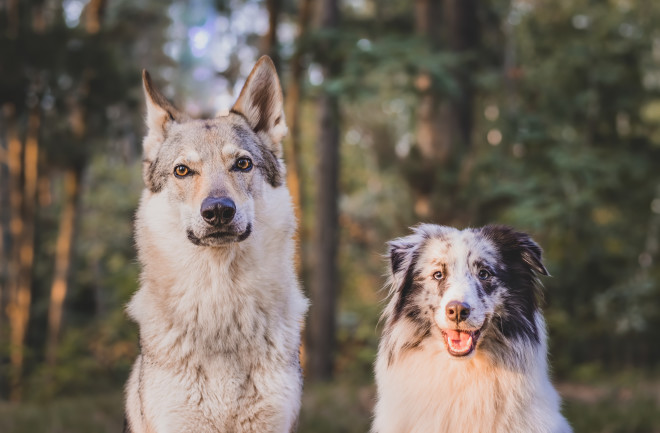Dogs and wolves have exceptional abilities to track and find food, and a new study says they use more than just their snouts. The canines can find hidden food if they see it being hidden first, suggesting that they not only rely on scents but also memory.
Previous research has suggested that both wolves and dogs are capable of social learning, known as observational spatial memory (OSM). But do dogs and wolves differ in this ability? Researchers seek to understand this question in the new study, published in PLOS ONE.
Spatial Learning in the Animal Kingdom
Many species in the animal kingdom are visual learners and can transmit knowledge through social learning, where they observe or interact with each other.
This skill is critical to finding food, recognizing and avoiding predators and finding mates. Part of social learning is OSM, or the ability to remember the location of food caches made by others through observing. The team writes that OSM skills depend on both social structures of animals and the frequency of watching events.
Read More: Dogs Have Co-Evolved With Humans Like No Other Species
Utilizing Food Caches for Survival
In highly social species, like coyotes, red foxes, arctic foxes and other canid species, they are known to make food caches. For example, wolves that hunt large prey in packs don't eat all the food at once and hide the food for later, according to the study. Some wolves will even steal other pack-mates food caches. But it is unknown how many caches the wolves remember, or how frequently wolves pilfer other caches.
For domesticated dogs, other studies have found that they also cache and retrieve food. Dogs can remember when food items disappear for about 30 minutes and can remember a hidden object a day after it was hidden.
Read More: How Dogs Perceive Time
Comparing Dogs and Wolves
To see how dogs and wild wolves learned these abilities and how they differed, the research team compared nine timber wolves with eight mixed-breed dogs, all hand-raised and residing at the Wolf Science Center in Ernsbrunn, Austria. The canines tested were in various age ranges during the experiments, and experiments took place over three different time periods.
For each animal, the team tested whether they could find four, six or eight caches of food either after seeing a human hide it, or without seeing it hidden.
Results showed that both wolves and dogs found the first five food caches faster and with less time searching if they observed the food being hidden. This means that both canine species didn’t rely on their noses alone to track down food and provides more support for the hypothesis that both kinds of animals are capable of OSM.
Read More: Why There's the Leader of the Wolf Pack
The Differences Between Dog and Wolf Traits
Overall, wolves outperformed dogs in finding hidden food, regardless of whether they observed or not. The team suspects this is because of the differences in traits like persistence and food-related motivation, rather than their OSM skills. Domesticated dogs rely on their owners for food acquisition, so searching for food among our furry friends is more relaxed.
“While domestication probably affected dogs’ willingness to adjust to humans, the results of the current study collaborate with previous findings suggesting that cognitive abilities do not differ very much between dogs and wolves,” the authors wrote in their study.
Read More: Dogs and Wolves Don’t Distinguish Between Generosity and Selfishness

